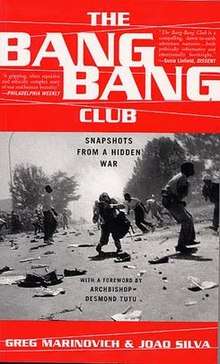The Bang-Bang Club (book)
The Bang-Bang Club: Snapshots from a Hidden War is a 2000 autobiographical styled text about the Bang-Bang Club, a group of four South African photographers active within the townships of South Africa during the apartheid period, particularly between 1990 and 1994. The journalists were Kevin Carter, Greg Marinovich, Ken Oosterbroek, and João Silva. The book was co-authored by two of the journalists, Greg Marinovich and João Silva.[1]
 | |
| Author | Greg Marinovich and Joao Silva |
|---|---|
| Original title | The Bang Bang club |
| Country | South Africa |
| Language | English |
| Genre | Autobiography |
| Published | 20 September 2000 Basic Books |
| Media type | Print (Hardback & Paperback) |
| Pages | 300 pp. (Hardcover edition) |
| ISBN | 0-465-04412-3 (Hardback) 0-465-04413-1 (Paperback) |
History
In the years between 1990 and 1994 the fight from apartheid to democracy in South Africa was extremely violent. About the members of the Bang Bang Club was much written at this time and later too. But the stories painted a picture "of a group of hard-living men who worked, played and hung out together pretty much all of the time", how Greg Marinovich wrote in the preface of the book. The next sentence started with the words: "Let us set the record straight: …" In 1997 started Marinovich and Joao Silva to write the book.[2] In the acknowledgments were mentioned the many Impimpi – informants who contributed to the book. Impimpi is a Zulu word and in the glossary of the book it is translated as "spy". These 45 people, the parents of Kevin Carter also, helped Marinovich and Silva to write the book "straight". Judith Matloff, also listed under impimpi, wrote in an article: "But the reporters and photographers stationed in South Africa at the time were also compassionate human beings who exposed themselves to danger because they wanted to record history".[3] Other witnesses or impimpi for the book from that era include: James Nachtwey, Peter Magubane, Brian Mkhize, Gilles Peress, Vivian Silva, and more.
The book was first published in January 2000 by William Heinemann, London, UK and then by Basic Books, New York. It was translated into Polish, Portuguese, Spanish and 2015 into German. It is published in 19 Editions.[4]
Book review
Niranjan Karnik[5] wrote the review for H-SAfrica.[6]
At the end of his review Niranjan Karnik wrote: "I have several concerns about the future of this profession".[5] He expressed that conflict journalist need a "debriefing" after the experience in a conflict or war zone "akin to what the International Committee of the Red Cross requires of its fieldworkers". The usefulness of the book is for him: "Its overall value is not as much in its use as source of history, but in how it openly exposes the way journalists suffer in the course of their work, and the heavy ethical and moral questions they face on an daily basis."
Karnik wrote that "Students of the media and aspiring journalists will find special value and significance in this book, for its unsparing and often graphic portrayal of events in South Africa."
The moral and ethical questions are central themes in the book. Karnik discuss the themes in the example of the noted photograph by Kevin Carter.
Carter, for example, won the 1994 Pulitzer Prize for a photograph of a starving child that he took in south sudan in 1993. The famous photograph shows a small, emaciated girl curled over in exhaustion while a vulture sits a short distance away on the ground next to her. The photograph became the cover image for many humanitarian groups in their fundraising appeals. It also raised ethical questions about the limits that journalists will go to get an image.
Karnik explains that the book "lacks the academic and critical analysis", which he is used to write as an author and which he reads in his profession.[7] But nevertheless he wrote that the book: "as a perspective into the dynamics of wartime reporting it is valuable".
Film adaptation
In 2010, the Canadian director Steven Silver released a film adaptation of the book as a full-feature film also entitled The Bang Bang Club.
References
- "The Bang-Bang Club, a factual account of news photographers in South Africa".
- Marinovich, Greg; Silva, João (20 September 2000). "Preface". The Bang-Bang Club: Snapshots from a Hidden War. New York, N.Y.: Basic Books. ISBN 0-465-04413-1. SELIBR 4962156.
- Matloff, Judith (2011). "Bang Bang Off Target". Columbia Journalism Review, CJR.
- "The Bang-Bang Club Snapshots From a Hidden War published in 19 Editions".
- "Niranjan Karnik".
- Karnik, Niranjan. "Review of Marinovich, Greg; Silva, Joao, The Bang Bang Club: Snapshots from a Hidden War, H-SAfrica, H-Net Reviews, June 2003. The Personal and Professional Price of Journalism". H-Net: Humanities & Social Sciences Online.
- "Author Karnik".